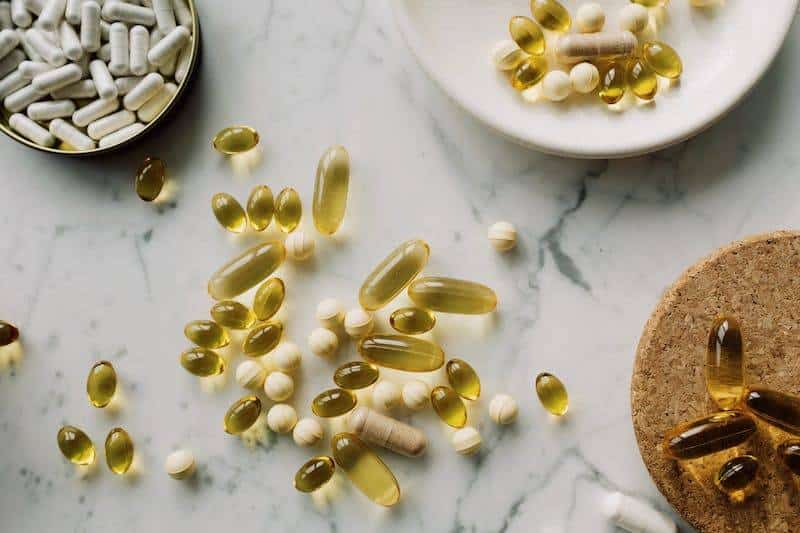As women age, their nutritional needs change. In particular, women over 40 may require specific vitamins and supplements to support their overall wellness, longevity, and graceful aging. In this blog, we explore the top 5 vitamins and supplements that every woman over 40 should Incorporate into their daily routine. Get ready to unlock the secrets to a healthier and happier you!
Vitamin D
Often called the “sunshine vitamin,” vitamin D plays a crucial role in maintaining bone health and preventing osteoporosis. It also supports a healthy immune system and may even help prevent certain cancers. As women over 40 are at a higher risk for osteoporosis, supplementing with vitamin D can be essential. A 2019 study published in the journal Nutrients found that vitamin D supplementation can prevent bone loss. In addition, it can help reduce the risk of fractures in postmenopausal women (1).

Vitamin D is a fat-soluble vitamin that our skin produces when exposed to sunlight. It’s vital for calcium absorption and bone health. This makes it particularly important for women over 40 to maintain strong bones and prevent osteoporosis. Vitamin D also has a significant role in supporting immune system function. As well as reducing inflammation, and possibly preventing certain types of cancer.
Food sources of vitamin D include fatty fish like salmon and tuna, egg yolks, and fortified dairy products. The recommended daily intake of vitamin D varies depending on age. However, for women over 40, it’s generally around 600 to 800 IU (international units) per day.
Calcium
Calcium is vital for maintaining strong bones and teeth and preventing osteoporosis. Women over 40 should pay particular attention to their calcium intake, as their ability to absorb calcium declines with age. Calcium supplementation has been shown to reduce the risk of fractures and bone loss in postmenopausal women. A 2017 study published in the Journal of the American Heart Association found that calcium supplementation might lower the risk of heart disease in women (2).

Calcium is the most abundant mineral in the body and is essential for building and maintaining strong bones and teeth. It also plays a vital role in nerve function, muscle contraction, and blood clotting.
Food sources rich in calcium include dairy products like milk, yogurt, and cheese. Also, leafy greens, almonds, and calcium-fortified foods. The recommended daily intake of calcium for women over 40 is 1,000 to 1,200 mg per day.
Magnesium
Magnesium is essential for a variety of bodily functions. For example, muscle and nerve function, regulating blood pressure, and maintaining bone health. It can be particularly beneficial for women over 40, as it may alleviate symptoms of menopause. Along with improve sleep quality, and support heart health. A 2012 study published in the American Journal of Clinical Nutrition reported that magnesium supplementation could improve sleep quality in older adults (3).
Magnesium is an essential mineral that supports over 300 enzyme reactions in the body. In fact, it plays a significant role in muscle and nerve function, blood sugar regulation, energy production, and maintaining a normal heart rhythm. Magnesium has been shown to help alleviate symptoms of menopause, improve sleep quality, and support heart health in women over 40.

Food sources of magnesium include nuts, seeds, whole grains, legumes, dark chocolate, and leafy green vegetables. The recommended daily intake of magnesium for women over 40 is 320 mg per day.
Omega-3 Fatty Acids
Omega-3 fatty acids, found in fish oil, have been shown to support heart health, brain function, and reduce inflammation. Women over 40 may benefit from incorporating omega-3 supplements into their routine for overall wellness and longevity. Studies have found that omega-3 fatty acid supplementation reduces the risk of heart-related events. Additionally, it may improve cognitive function in older adults. A 2016 study published in the journal Nutrients found that omega-3 fatty acids may improve cognitive function in older adults (4).
Omega-3 fatty acids are essential polyunsaturated fats that the body cannot produce on its own, so they must be obtained through diet or supplementation. They play a crucial role in maintaining healthy cell membranes and reducing inflammation in the body. Omega-3 fatty acids also support heart health, brain function, and may help improve mood.

Food sources of omega-3 fatty acids include fatty fish like salmon, mackerel, and sardines, as well as walnuts, flaxseeds, and chia seeds. The American Heart Association recommends that adults consume at least two servings of fatty fish per week. This provides about 500 mg of EPA and DHA (the two primary types of omega-3s) per day.
Coenzyme Q10 (CoQ10)
CoQ10 is a natural antioxidant that plays a crucial role in energy production within cells. As the body’s ability to produce CoQ10 decreases with age, supplementation can be particularly beneficial for women over 40. Thus supporting healthy aging and heart health. CoQ10 supplementation has been shown to improve heart function and reduce the risk of heart failure.
CoQ10 is a naturally occurring antioxidant that is found in every cell of the human body. It plays a key role in energy production within cells and helps protect cells from damage caused by free radicals. CoQ10 levels tend to decrease with age, which is why supplementation can be beneficial for women over 40. A 2017 study published in the journal Aging found that CoQ10 supplementation could reduce oxidative stress. Moreover, it can improve mitochondrial function, promoting healthy aging (5).

CoQ10 has been shown to support heart health, improve physical performance, and reduce muscle pain associated with statin use. Food sources of CoQ10 include organ meats, beef, sardines, mackerel, and peanuts. There is no established recommended daily intake for CoQ10. However, a common dosage range for adults is 100-200 mg per day.
Final Thoughts on the Top 5 Vitamins & Supplements
In addition to these five essential vitamins and supplements, maintaining a well-rounded approach to your health can help you experience the best results. A healthy lifestyle that incorporates regular exercise, stress management, and a balanced diet is key to supporting your overall wellness.
Regular exercise can improve cardiovascular health, bone density, and mood. Aim to include a mix of cardiovascular activities, strength training, and flexibility exercises in your routine. Yoga, tai chi, and pilates are excellent options for improving flexibility and balance, which are particularly important as you age.
Stress management is crucial in maintaining mental and emotional health. Engage in activities that promote relaxation, such as meditation, deep breathing, or spending time in nature. Building a strong social support network can also help in managing stress and enhancing emotional well-being.
A balanced diet is essential for providing your body with the necessary nutrients to support your overall health. Aim to eat a variety of fruits, vegetables, whole grains, lean proteins, and healthy fats. Antioxidant-rich foods like berries, leafy greens, and nuts can help combat the effects of aging and support immune function.
By taking a comprehensive approach to your health, you can empower yourself to live a vibrant, healthy life for many years. Remember to consult with a medical professional before making any changes to your supplement routine, as individual needs may vary.
References:
- Bolland, M. J., Grey, A., & Avenell, A. (2019). Effects of vitamin D supplementation on musculoskeletal health: a systematic review, meta-analysis, and trial sequential analysis. Nutrients, 11(11), 2601.
- Wang, X., Chen, H., Ouyang, Y., Liu, J., Zhao, G., Bao, W., & Yan, M. (2017). Dietary calcium intake and risk of cardiovascular disease, stroke, and fracture: a meta-analysis of prospective cohort studies. Journal of the American Heart Association, 6(6), e006798.
- Abbasi, B., Kimiagar, M., Sadeghniiat, K., Shirazi, M. M., Hedayati, M., & Rashidkhani, B. (2012). The effect of magnesium supplementation on primary insomnia in elderly: A double-blind placebo-controlled clinical trial. Journal of Research in Medical Sciences, 17(12), 1161-1169.
- Cederholm, T., Salem, N., & Palmblad, J. (2013). ω-3 fatty acids in the prevention of cognitive decline in humans. Advances in Nutrition, 4(6), 672-676.
- Littarru, G. P., & Tiano, L. (2007). Bioenergetic and antioxidant properties of coenzyme Q10: recent developments. Molecular Biotechnology, 37(1), 31-37.



